
India's low cost carrier IndiGo is planning to bring smaller towns into its orbit with ATR-72 planes, according to the schedule submitted by the airline to the Directorate General of Civil Aviation (DGCA).
Indigo, with highest market share in domestic aviation market, the company now plan to connect 13 small towns in the hub-and-spoke model under its regional operations, beginning this winter, business daily Business Standard reported on Monday.
The airline has sought DGCA's approval to operate 85 daily flights with its new ATR-72 planes to Tier II cities, which can act as a feeder to its main routes. Some destinations IndiGo is planning to fly to are Gorakhpur, Allahabad, Shirdi, Bhuj, Bhopal, Gwalior, Vijayawada, and Tirupati.
Simultaneously, the airline plans to deploy ATR-72 planes on some routes that are mostly in north-eastern states and currently served by the Airbus A320.
In its filing, IndiGo has indicated it will launch regional operations between Hyderabad and Nagpur from November 10. While Hyderabad and Nagpur will be its southern and western hubs, the airline plans to cover the east and north-eastern region from Kolkata and Delhi.
"The destinations are all either religious or industrial hubs, there will be no shortage of traffic and IndiGo will have the advantage of having extensive connectivity to become the carrier of choice in these routes," a rival airline official told BS.
IndiGo's proposal will be taken up for approval by the civil aviation regulator later this month. The management has said commercial operations will start by the end of this year, and the airline will have seven ATR planes by next March.
"Documentation work with the aircraft and engine manufacturers continues towards finalisation of the purchase agreements and currently our plan is to launch the commercial operations by the end of this calendar year," IndiGo's President Aditya Ghosh said in a conference call.
The airline will participate in the second round of bidding for the regional connectivity scheme and has asked the civil aviation ministry to remove the exclusivity clause, which gives a successful bidder a monopoly over a route for three years.









!['Had denied Housefull franchise as they wanted me to wear a bikini': Tia Bajpai on turning down bold scripts [Exclusive]](https://data1.ibtimes.co.in/en/full/806605/had-denied-housefull-franchise-they-wanted-me-wear-bikini-tia-bajpai-turning-down-bold.png?w=220&h=138)



